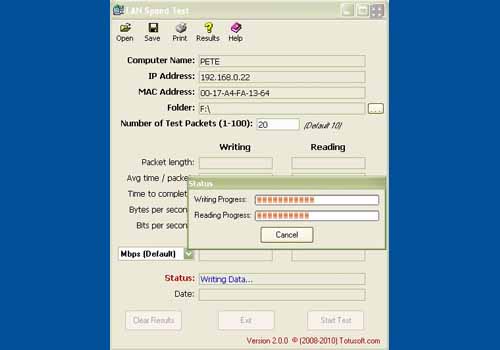
We have a PCMag Speed Test (Opens in a new window), which you can use any time, even on a mobile device. The conditions on your internet connection can be very different at different times of day. Skip testing at peak hours, like in the evening when everyone at home, or in the whole neighborhood, is streaming music or movies. You'll have a lot less network overhead than you would with a Wi-Fi connection.

#Speedtest .net Pc
Log out of your VPN software for the duration of the test it adds a lot of overhead to the connection.įor real accuracy, plug your PC directly into the router via Ethernet. That includes streaming media or live video meetings. Turn off any downloads or uploads you have going on your system. Stick with a third-party test tool.īefore you run any of these tests, be sure to: If it's your own ISP, you can't know for sure that the connection between you and the ISP servers won't be optimized for better speeds. Most ISPs also offer a speed test, usually a variation of something you'll see below. Is your ISP delivering the data speeds you were promised? Is there even a way to find out? Should you just take their word for it? The answer to these questions, respectively, are "we'll see," "Yep!," and "HELL NO!" We can say that because you have access to free tools that will clock your own personal connection.
#Speedtest .net how to


Var intervalTime = Math.Max(d, Math.Pow(2,(Math.Log10(timePerPacket)))*100) var timePerPacket = 5000 / nrOfPackets // Time per package in ms My process would be something like this, measure for 5 second and gather data, ie bytes recieved as well as the number of packets. If you are writing it for all kinds of connections I would recommend you make the solution dynamic, ie if the speed is high you can easily decrease the averaging interval but in the case of slow connections you must increase the averaging interval.Įither do as recommends by having a moving average or simply increase the sleep up to maybe 1 second.Īnd be sure to divide by the actual time taken rather than the time passed to Thread.Sleep(). Given that your speed is 60 KB/s I would have set the running time to 10 seconds to get at least 9 packages per average.
#Speedtest .net download
I believe the counter only counts whole packages, and if you for example are downloading a file the packages might get as big as 64 KB ( 65,535 bytes, IPv4 max package size) which is quite a lot if your maximum download throughput is 60 KB/s and you are measuring 200 ms intervals.

Concat(reads).Take(20) īy looking at another answer to a question you posted in NetworkInterface.GetIPv4Statistics().BytesReceived - What does it return? I believe the issue might be that you are using to small intervals. Var br = nic.GetIPv4Statistics().BytesReceived Var lastBr = nic.GetIPv4Statistics().BytesReceived Var nic = nics.Single(n => n.Name = "Local Area Connection") I like flindenberg's answer (don't change the accept), and I noticed that some polling periods would return "0" that aligns with his/her conclusions. Also, don't forget that any old process might be doing any old thing on the internet these days (without stricter firewall settings). Things to keep in mind are Kbps is in bits and HTTP data is often compressed so the "downloaded bytes" will be significantly smaller for highly compressible data.
#Speedtest .net code
Here is a quick snippet of code from LINQPad.


 0 kommentar(er)
0 kommentar(er)
